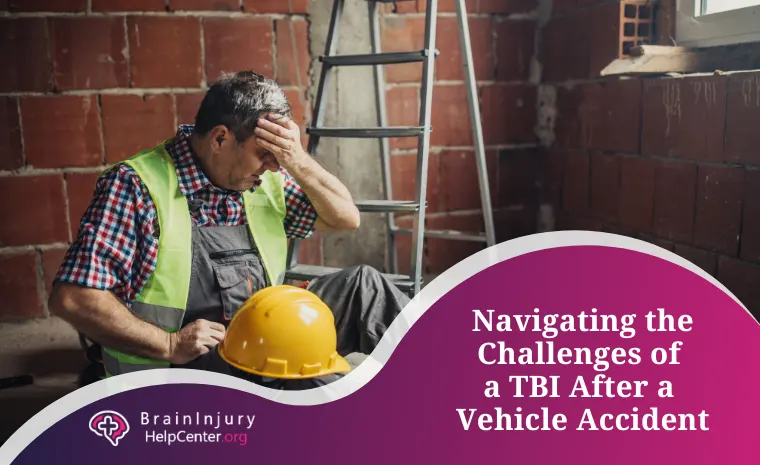Although it is common to have a bump to the head now and again due to clumsiness or carelessness, these bumps we assume to be minor may be more serious than we think.
The Centers for Disease Control and Prevention (CDC) reports that 1.5 million Americans sustain a traumatic brain injury every year. Of this number, 230,000 are hospitalized, and up to 90,000 individuals experience long-term disability.
Severe head injuries may be sustained in a number of ways, and they are commonly associated with injury in falls among the elderly. However, one of the most common reasons for a TBI is motor vehicle accidents.
In this article, we will discuss:
- What is a TBI?
- How do you get a TBI from a car accident?
- Symptoms of a TBI after a vehicle accident
- Types of brain injuries from a car accident
- What should you do if you have a TBI?
Defining a TBI
The Mayo Clinic defines a traumatic brain injury as a “result from a violent blow or jolt to the head or body.” It may also be the result of an object piercing through brain tissue, such as in the case of gunshot wounds or skull fractures that penetrate the brain.

A head injury can have serious long-term consequences, potentially leading to brain damage and disruption of normal brain function. This may result in physical, cognitive, and sensory symptoms that can persist or even prove fatal in extreme cases.
How Do You Get A TBI From A Car Accident?
In a motor vehicle accident, the force caused by the collision can cause the driver or passengers to slam their heads against the steering wheel, headrest, or window. However, a blow to the head is not the only way one may sustain a closed head injury.
The violent jerking of the head and neck caused by the sudden impact of an auto accident that causes whiplash can also cause the brain to shift around inside the skull, resulting in a mild injury.
Due to the lack of physical evidence of damage to the brain, these single-head injuries may go without medical care, causing long-term effects for the victims.
Symptoms of a TBI After a Vehicle Accident
The symptoms of a TBI may vary from mild to severe, depending on the severity of the injury, the accident victim’s age, and more. Immediately following a traumatic accident, some of the symptoms of a TBI may become evident right away, while other symptoms, usually from secondary brain injuries, may appear a few days or weeks after the incident.
Some of the most common symptoms of mild to severe head injuries include:
- Headaches
- Memory loss
- Loss of consciousness
- Loss of balance
- Blurry or double-vision
- Mood swings
- Behavioral changes
- Change in sleep patterns or difficulty sleeping
- Ringing in the ears
- Convulsions or seizures
- Slurred speech
- Poor impulse control
- Profound confusion, restlessness, or agitation
- Weakness or numbness in arms and legs
Symptoms in Children
Young children may not exhibit the same signs of severe injury as adults, and they might be unable to effectively communicate any discomfort they are feeling. It is important to be mindful of possible symptoms in very young kids.
Some of the most common symptoms in children with TBIs are:
- Constant crying or inability to be consoled
- Change in an ability to pay attention
- Altered sleeping habits
- Easily irritable
- Seizures
- Loss of interest in their favorite toys or activities
- Drowsiness
- Feeling sad or depressed
- Change in eating or nursing habits
If you or a loved one are experiencing any of the following symptoms, feel you may have sustained a TBI after a vehicle accident, or feel worsening of symptoms, you must seek medical treatment from a credible health care provider immediately.
Common Types of Brain Injuries Sustained in a Car Accident
Due to the manner of the accident and the area in which the brain was damaged, there are different types of head injuries that one may sustain in a car accident.
1. Concussion
A concussion is a type of head injury that occurs in the event of an impactful motor vehicle crash or sudden force applied to the head. It can cause loss of consciousness, but may also present with less severe symptoms such as disorientation and dizziness.
2. Penetrating brain injury
A penetrating brain injury is a type of injury that occurs when an object pierces the brain. It is easy to identify because any bleeding from the scalp can be an indication of this kind of damage.
3. Diffuse axonal injury
Severe head rotation can result in the tearing of the brain’s internal structures. Considered a severe concussion, this type of brain injury may result in serious consequences such as impairing injuries, a loss of memory, unconsciousness, and more. In extreme cases, it may even lead to coma or death. However, milder cases can be treated through rehabilitation.
4. Contusion
A contusion is more commonly known as a bruise, however when the brain is involved this could mean a more serious situation. In some cases, surgery may be required to remove any contusions.
5. Acquired brain injuries
Acquired brain injuries are those that occur due to conditions other than the direct force of an accident. Acquired brain injuries may be caused by blood clots, lung or rib damage, chest injuries, and more. Such issues can easily be identified by medical providers, who can then recommend a suitable treatment plan.
6. Coup-Contrecoup
A coup-contrecoup injury is when there are injuries on both sides of the brain. This type of injury may occur due to the sudden movement within the skull in a motor vehicle accident. A violent or forceful accident, such as a rollover collision, can cause this type of injury.
What Should You Do if You Have Sustained a TBI?
If you have sustained a TBI after a vehicle accident, there are certain things you can do to aid your recovery process. Here are some recovery tips:
- Get plenty of sleep and rest
- Avoid physically demanding activities such as working out, heavy chores, and more
- Avoid tasks that require a lot of concentration
- Avoid activities such as recreational sports that could lead to another injury
- When your doctor has given you clearance to return to your old activities, do so gradually
- Avoid operating heavy machinery, such as driving a car
- Take it easy at work, consider working half days, and gradually return to full-time work
- Take only medication your doctor prescribes
- Do not drink any alcohol until your doctor says you are well enough
- Minimize your computer use, this includes video games
When in doubt, it is always wise to seek the opinion of your doctor first before embarking on any hospital treatments or starting any new activities. Getting an expert opinion can help reduce the risk of worsening your TBI and increase the rate of recovery.
Maximizing Your Recovery with the Help of a Brain Injury Lawyer
If you sustained a TBI after a vehicle accident that was caused by a negligent driver, you may be eligible to file a personal injury claim to recover compensation for your injuries and damages and to hold the responsible party accountable.
To be able to file a valid claim, you must have a knowledgeable brain injury lawyer by your side to help with the process of your claim. Although it is possible to file a brain injury claim without the need for a lawyer, filing a claim without one may not be beneficial in the long run.
Insurance companies are notorious for tricking clients into lowering the value of their claims to avoid paying a fair settlement offer. Handling cases of these natures can be very complex, most especially if the party at fault denies responsibility for the accident.
A brain injury lawyer will be able to recover the compensation you deserve for your pain and suffering, medical expenses, property damage, and more. An experienced accident lawyer will also help you get the medical care you need.
Get Help From An Award-Winning Brain Injury Attorney
Are you or a loved one suffering from a traumatic brain injury? Are you in need of assistance? Help is available to you.
Do not hesitate to contact the Brain Injury Help Center. We can help you get access to the best, cutting-edge medical treatment, the right technology, and the legal aid you need.We are here for you. Call us at (866) 576-0936.









